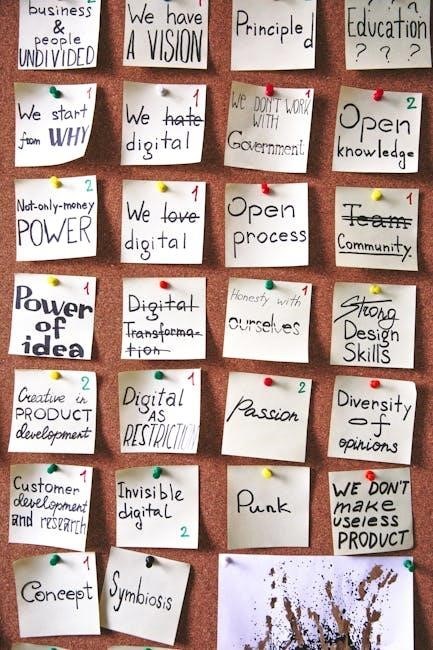
Importance of Honesty in Recovery
Honesty is crucial in recovery, fostering self-respect and healing․ It helps acknowledge addiction’s impact, confront triggers, and build strong relationships․ Worksheets guide self-reflection, promoting personal growth and accountability․
1․1․ How Honesty Promotes Self-Respect and Healing
Honesty in recovery fosters self-respect by encouraging individuals to confront their past actions and emotions truthfully․ It breaks down denial, allowing for accountability and healing․ By acknowledging mistakes, individuals rebuild trust in themselves and others․ Worksheets guide this process, helping users explore challenging situations and identify patterns․ Self-awareness and transparency create a foundation for personal growth, enabling individuals to heal emotionally and regain their sense of self-worth․ This authenticity is vital for lasting recovery and spiritual well-being․
1․2․ The Role of Honesty in Building Strong Relationships
Honesty is vital for trust and communication in relationships during recovery․ By acknowledging past wrongs and being transparent about current struggles, individuals rebuild trust with loved ones․ This openness fosters empathy and understanding, strengthening bonds․ Worksheets help identify patterns of dishonesty and explore emotions tied to these actions․ Repairing relationships through honesty promotes accountability and mutual respect, creating a supportive network essential for recovery․ This foundation of truthfulness is key to healing and maintaining healthy, lasting connections․
1․3․ Overcoming Addiction Through Truthfulness
Honesty is a cornerstone of addiction recovery, enabling individuals to confront the harm caused by their actions․ By acknowledging the truth about their addiction, they can break free from denial and minimization․ Truthfulness fosters accountability, allowing individuals to take responsibility for their actions and develop a clearer understanding of their recovery needs․ Worksheets guide users to explore situations where honesty was challenging, helping them identify patterns and triggers․ This self-reflection promotes emotional clarity and prevents relapse, fostering a path toward lasting change and personal growth․

Honesty Worksheets in Recovery
Honesty worksheets are tools for self-reflection, helping individuals explore their thoughts, emotions, and behaviors․ They guide users to identify patterns and challenges, fostering accountability and growth․
2․1․ What Are Honesty Worksheets?
Honesty worksheets are structured tools designed to guide individuals in self-reflection and personal growth during recovery․ They provide exercises and prompts to explore thoughts, emotions, and behaviors, helping users identify patterns and challenges related to honesty․ These worksheets often include questions and activities that encourage individuals to examine situations where honesty was difficult, fostering accountability and insight․ They are commonly used in therapy and support groups to help individuals develop greater self-awareness and improve their ability to practice honesty in daily life․
2․2․ How Worksheets Facilitate Self-Reflection
Honesty worksheets facilitate self-reflection by providing structured exercises that guide individuals to explore their thoughts, emotions, and behaviors․ They offer prompts and questions that encourage users to examine specific situations, helping them identify patterns and gain insights into their motivations and fears․ By engaging with these tools, individuals can develop a deeper understanding of themselves and their relationship with honesty, fostering personal growth and accountability․ This process enables them to address challenges and make meaningful changes in their recovery journey․

Tools and Techniques for Practicing Honesty
Tools and techniques for practicing honesty include CBT exercises, daily 10th Step practices, and identifying personal values to foster self-awareness and integrity in recovery․
3․1․ The 10th Step of AA/NA as a Daily Practice
The 10th Step of AA/NA emphasizes daily reflection and honesty․ It involves taking personal inventory, admitting wrongs, and promptly making amends․ Worksheets can guide this process, helping individuals identify patterns of dishonesty, understand their motivations, and develop strategies for improvement․ By incorporating this step into daily routines, individuals cultivate self-awareness, accountability, and emotional resilience․ This practice not only strengthens recovery but also enhances relationships and overall well-being by fostering a commitment to truthfulness and personal growth․
3․2․ Identifying Personal Values and Their Impact on Honesty
Identifying personal values is essential for practicing honesty in recovery․ Worksheets help individuals reflect on core values, such as integrity, respect, and fairness, and assess how these values align with their actions․ By understanding the connection between values and honesty, individuals can make conscious decisions that support their recovery․ When actions contradict personal values, dishonesty often follows, hindering progress․ Aligning behavior with values fosters authenticity, strengthens relationships, and promotes long-term recovery success․

Therapeutic Approaches in Honesty Worksheets
Therapeutic approaches like CBT and Motivational Interviewing are integrated into honesty worksheets․ These methods help individuals identify negative thought patterns and motivate behavioral change, fostering truthful self-expression․
4․1․ Cognitive-Behavioral Therapy (CBT) Techniques
Cognitive-Behavioral Therapy (CBT) techniques in honesty worksheets help individuals identify and challenge dishonest thought patterns․ By exploring beliefs and behaviors, users can address triggers and develop truthful responses․ CBT encourages self-reflection, fostering awareness of how dishonesty impacts recovery․ Through structured exercises, individuals learn to replace harmful habits with honest communication, promoting lasting change and accountability in their journey toward sobriety and personal growth․
4․2․ Motivational Interviewing for Behavioral Change
Motivational Interviewing (MI) techniques in honesty worksheets guide individuals to explore and resolve ambivalence about truthful behavior․ By fostering self-motivation, MI helps users recognize the benefits of honesty and commit to change․ Worksheets incorporate open-ended questions and affirmations to strengthen resolve․ This approach encourages individuals to align their actions with personal values, promoting authenticity and accountability․ MI empowers users to overcome resistance and embrace honesty as a cornerstone of their recovery journey, leading to sustainable behavioral change and personal growth․
Radical Honesty in Recovery
Radical honesty involves complete transparency, fostering deep self-reflection and accountability․ It encourages individuals to confront truths about their actions and emotions, aiding in transformative recovery growth․
5․1․ Understanding Radical Honesty
Radical honesty involves complete transparency and truthfulness in all interactions․ It requires individuals to openly share their thoughts, feelings, and experiences without withholding information․ This approach helps individuals confront past behaviors, acknowledge the consequences of their actions, and take responsibility for their choices․ Radical honesty fosters accountability and self-awareness, which are essential for personal growth and recovery․ Worksheets often include exercises that guide individuals in practicing radical honesty, encouraging them to reflect on their values and the impact of their actions on themselves and others․ By embracing radical honesty, individuals can build trust and strengthen relationships, which are critical components of a successful recovery journey․
5․2․ Benefits of Radical Honesty in Recovery
Radical honesty offers numerous benefits in recovery, including enhanced self-awareness and accountability․ By openly sharing thoughts and feelings, individuals break free from self-deception and denial, fostering emotional healing․ It strengthens relationships by building trust and authenticity, which are vital for long-term recovery․ Worksheets guide individuals in practicing radical honesty, helping them confront past behaviors and take responsibility․ This approach also reduces guilt and shame, promoting a sense of freedom and empowerment․ Ultimately, radical honesty supports lasting change and personal growth, making it a powerful tool in the recovery process․
Addressing Dishonesty in Recovery
Dishonesty hinders recovery progress, leading to guilt and strained relationships․ Worksheets help identify dishonest patterns, enabling individuals to confront and correct harmful behaviors, fostering accountability and growth․
6․1․ Identifying Forms of Dishonesty
Honesty worksheets help individuals recognize dishonesty patterns, such as withholding truths, manipulating facts, or avoiding difficult conversations․ These exercises encourage self-reflection to identify how dishonesty manifests in thoughts, words, and actions․ By exploring specific situations where dishonesty occurred, individuals can pinpoint underlying fears or motivations․ Worksheets also guide users to list people they may be dishonest with and the consequences of such behavior․ This process fosters accountability and prepares individuals to address dishonesty constructively, fostering a more authentic recovery journey․
6․2․ The Impact of Dishonesty on Recovery Progress
Dishonesty can hinder recovery by disrupting trust and personal growth․ It creates emotional distance, making it harder to form meaningful connections with others․ When individuals withhold truths, they risk relapse, as unresolved issues fester․ Dishonesty also perpetuates self-deception, delaying accountability and healing․ Recovery relies on trust, and dishonesty erodes this foundation, making progress stagnant․ Worksheets highlight how dishonesty can lead to feelings of guilt and shame, which complicate the journey toward lasting change and self-awareness․
Creating a Structured Plan for Honesty
Develop a clear plan to practice honesty daily, using worksheets to track progress and reflect on values․ Outline actionable steps to foster truthful habits and accountability․
7․1․ Setting Personal Goals for Honesty
Setting personal goals for honesty involves identifying actionable steps to cultivate truthfulness․ Use worksheets to define clear objectives, such as daily reflections or identifying patterns of dishonesty․ Commit to accountability by sharing goals with a sponsor or trusted individual․ Regularly assess progress and adjust strategies as needed․ Celebrate milestones to reinforce commitment․ These goals help build self-awareness, integrity, and trust in relationships, fostering a stronger foundation for recovery․ Accountability and transparency are key to lasting change and personal growth․
7․2․ Strategies for Maintaining Honesty in Daily Life
Practicing honesty daily involves consistent self-reflection and accountability․ Use worksheets to identify patterns of dishonesty and develop strategies for improvement․ Implement tools like journaling or the AA/NA 10th step to stay mindful of truthful behavior․ Engage in open communication with support networks to foster trust and transparency․ Celebrate progress to reinforce commitment․ These strategies help individuals maintain integrity, build stronger relationships, and sustain long-term recovery․ Honesty becomes a habitual practice, promoting personal growth and a more authentic life․

Celebrating Milestones in Honest Recovery
Celebrating milestones acknowledges progress and fosters motivation․ Recognizing achievements, no matter how small, reinforces commitment to honesty and strengthens the recovery journey․
8․1․ Acknowledging Progress and Growth
Acknowledging progress and growth in recovery is vital for building confidence and motivation․ Honesty worksheets help individuals track their journey, identifying improvements and maintaining commitment to their goals․ Recognizing milestones, no matter how small, reinforces the importance of truthfulness and self-awareness․ This process fosters a deeper understanding of personal values and their role in maintaining sobriety․ By celebrating achievements, individuals strengthen their resolve and create a foundation for lasting change․
8․2․ The Role of Support Networks in Celebrating Honesty
Support networks play a vital role in celebrating honesty during recovery․ Sharing achievements with trusted individuals or groups reinforces the importance of truthfulness․ Honesty worksheets often involve accountability partners who provide encouragement and celebrate progress․ This collective acknowledgment strengthens relationships and fosters a sense of community․ Celebrating milestones with others enhances motivation and reinforces the commitment to maintaining honesty in daily life, making the recovery journey more meaningful and sustainable․
Honesty is vital in recovery, fostering self-respect and healing․ Worksheets guide self-reflection, promoting personal growth and accountability, leading to lasting change and a truthful recovery journey․
9․1․ The Transformative Power of Honesty in Recovery
Honesty holds profound transformative power in recovery, enabling individuals to confront past actions and emotions․ By fostering self-reflection and accountability, it promotes personal growth and healing․ Worksheets guide users to explore challenging situations, identify patterns, and align their actions with personal values․ This process cultivates self-awareness, integrity, and resilience․ Honesty rebuilds trust, strengthens relationships, and empowers individuals to embrace their true selves․ Its impact extends beyond recovery, fostering lasting change and a commitment to truthful living, ultimately transforming lives and paving the way for a brighter future․
9․2․ Final Thoughts on Using Worksheets for Lasting Change
Honesty worksheets are a powerful tool for fostering lasting change in recovery․ They provide structure for self-reflection, helping individuals confront their truths, align with values, and build accountability․ By exploring challenging emotions and behaviors, worksheets facilitate personal growth and healing; Regular use of these tools strengthens self-awareness, promoting honest communication and actionable steps toward recovery․ Ultimately, worksheets empower individuals to embrace honesty as a cornerstone of their journey, leading to transformative and enduring change in their lives and relationships․